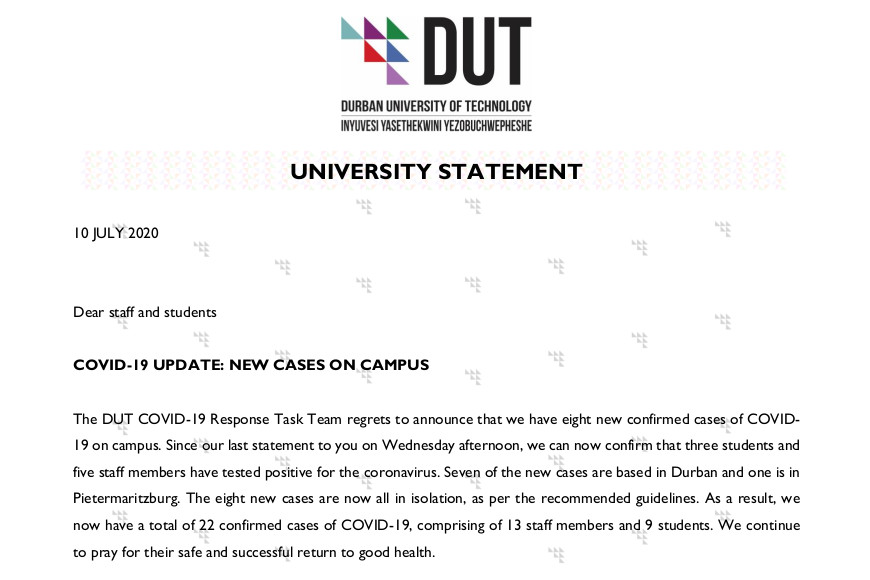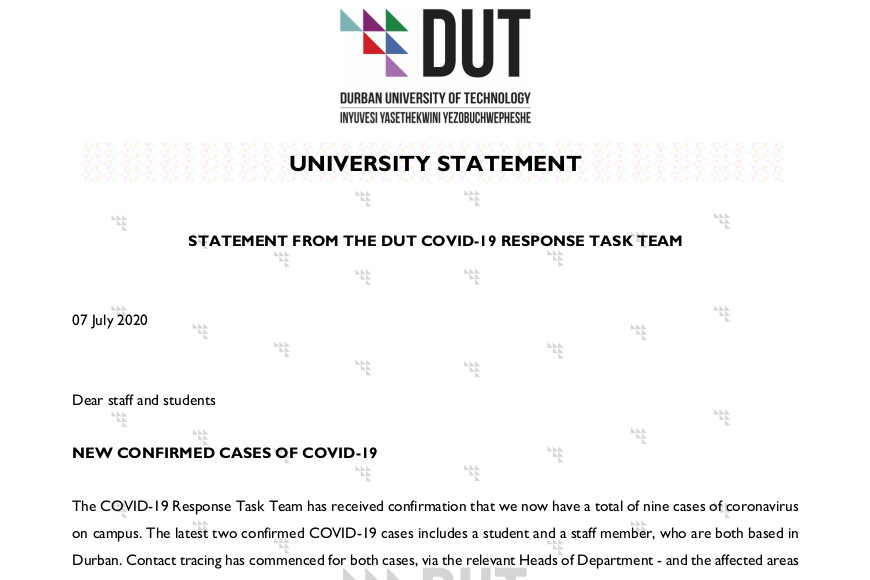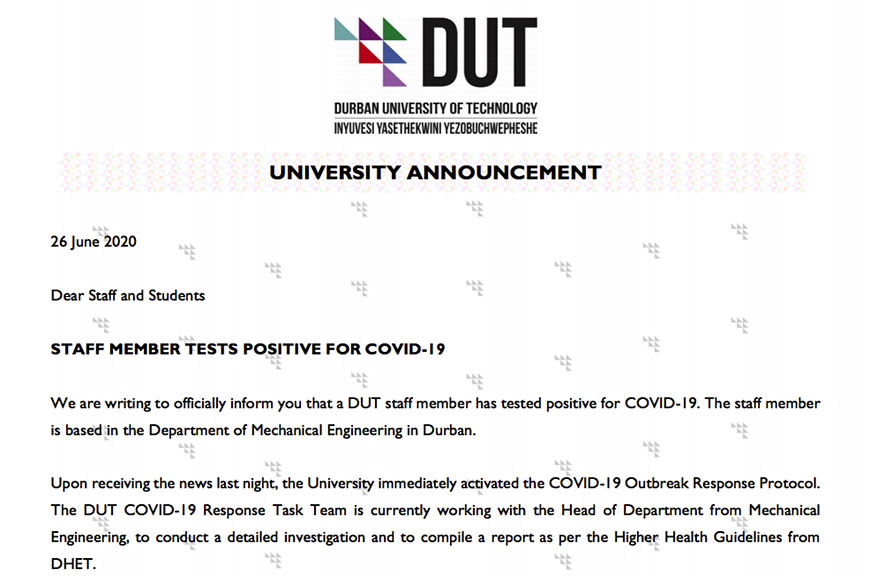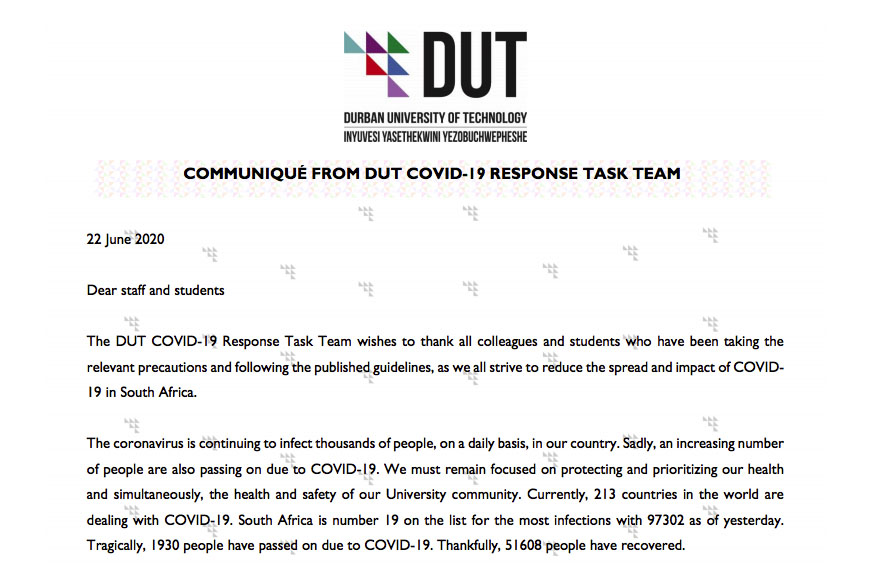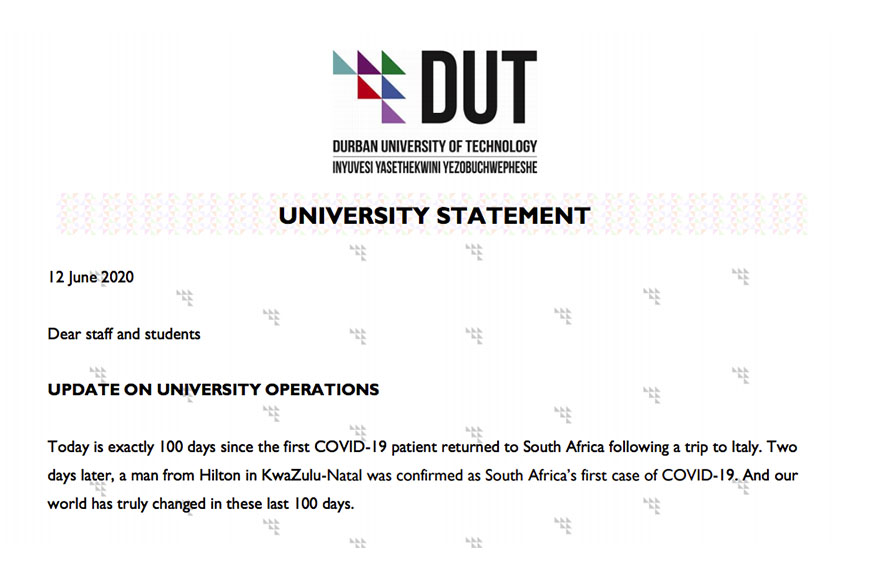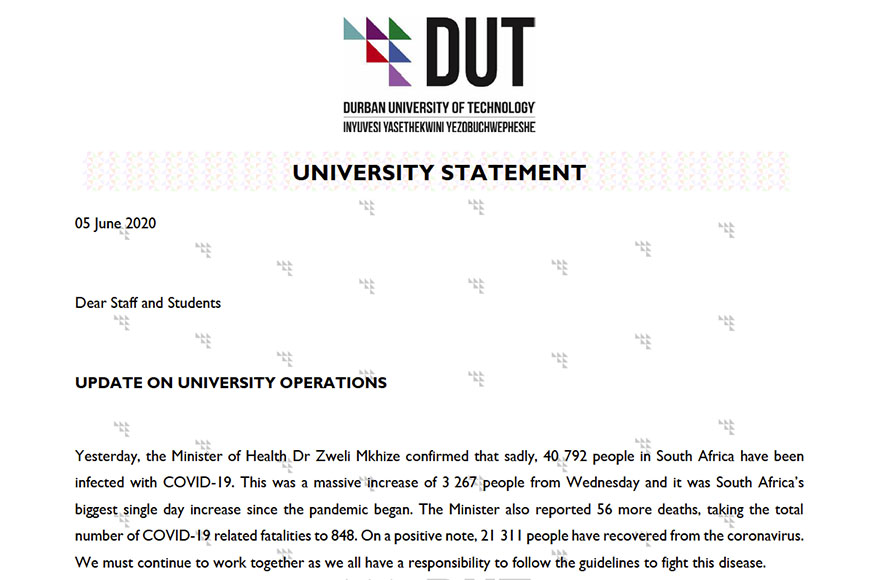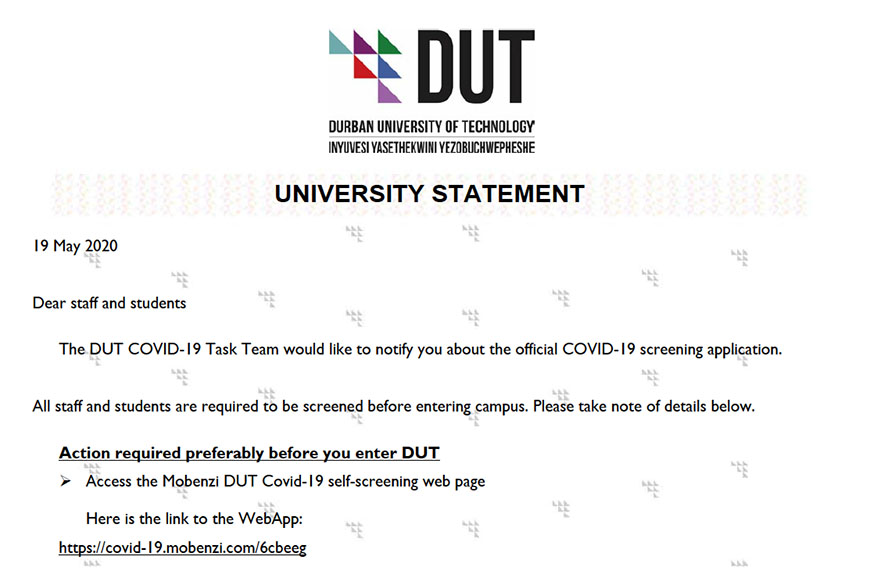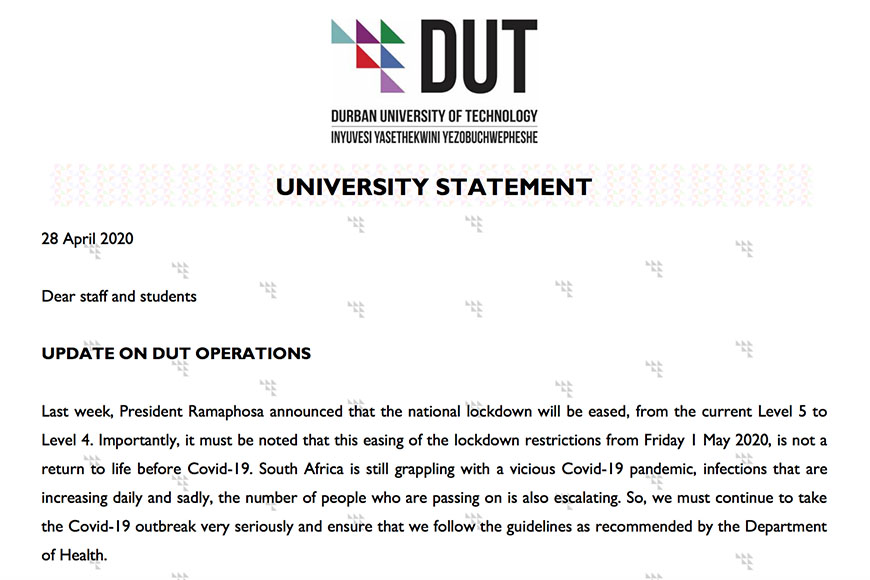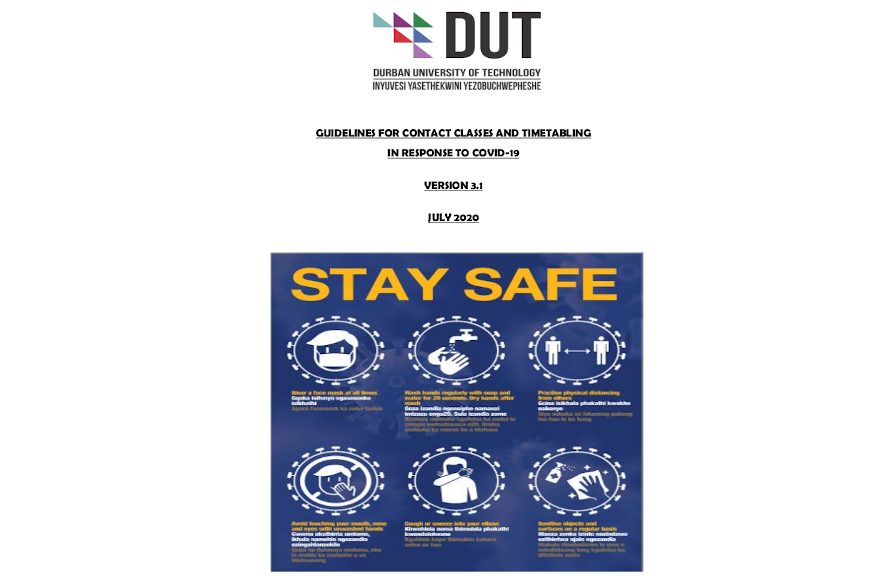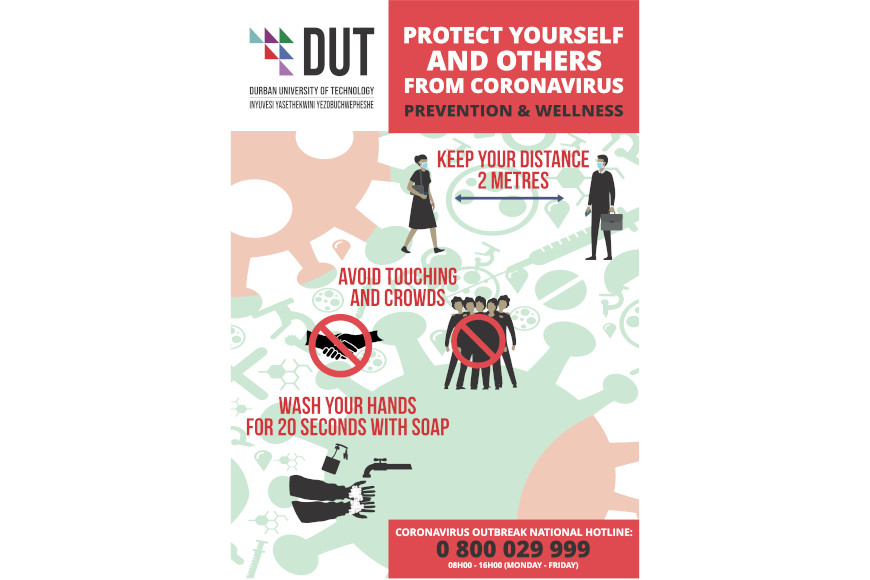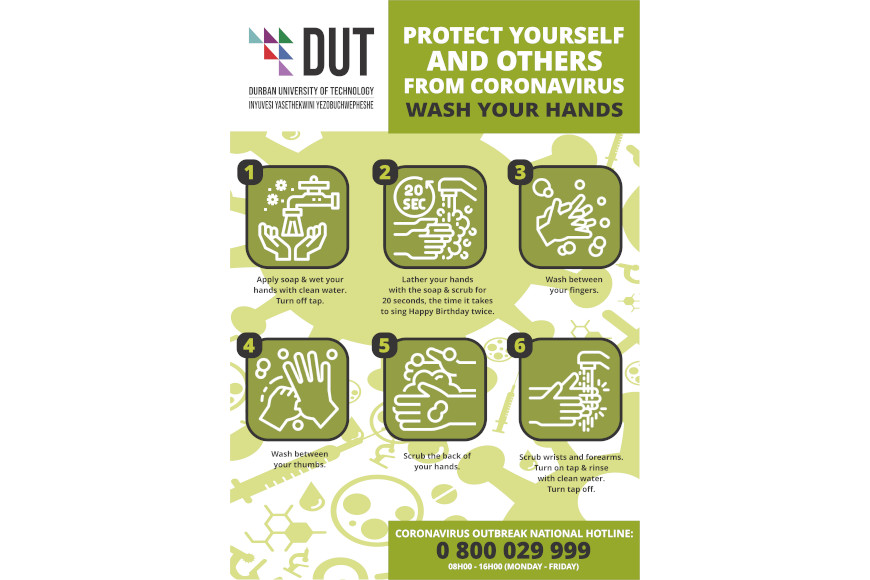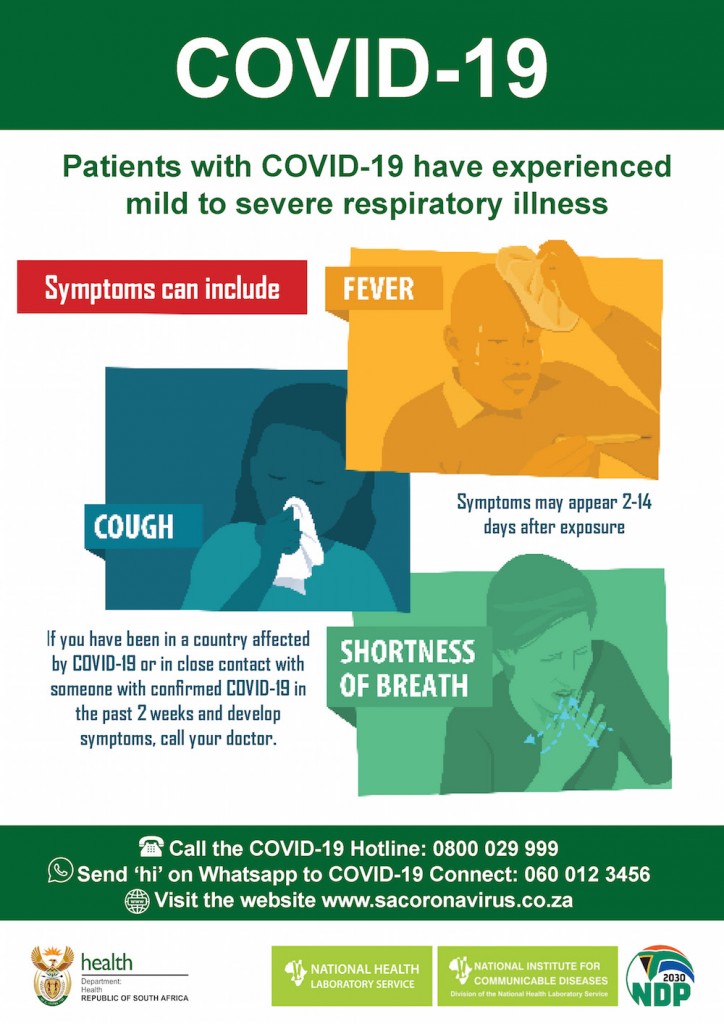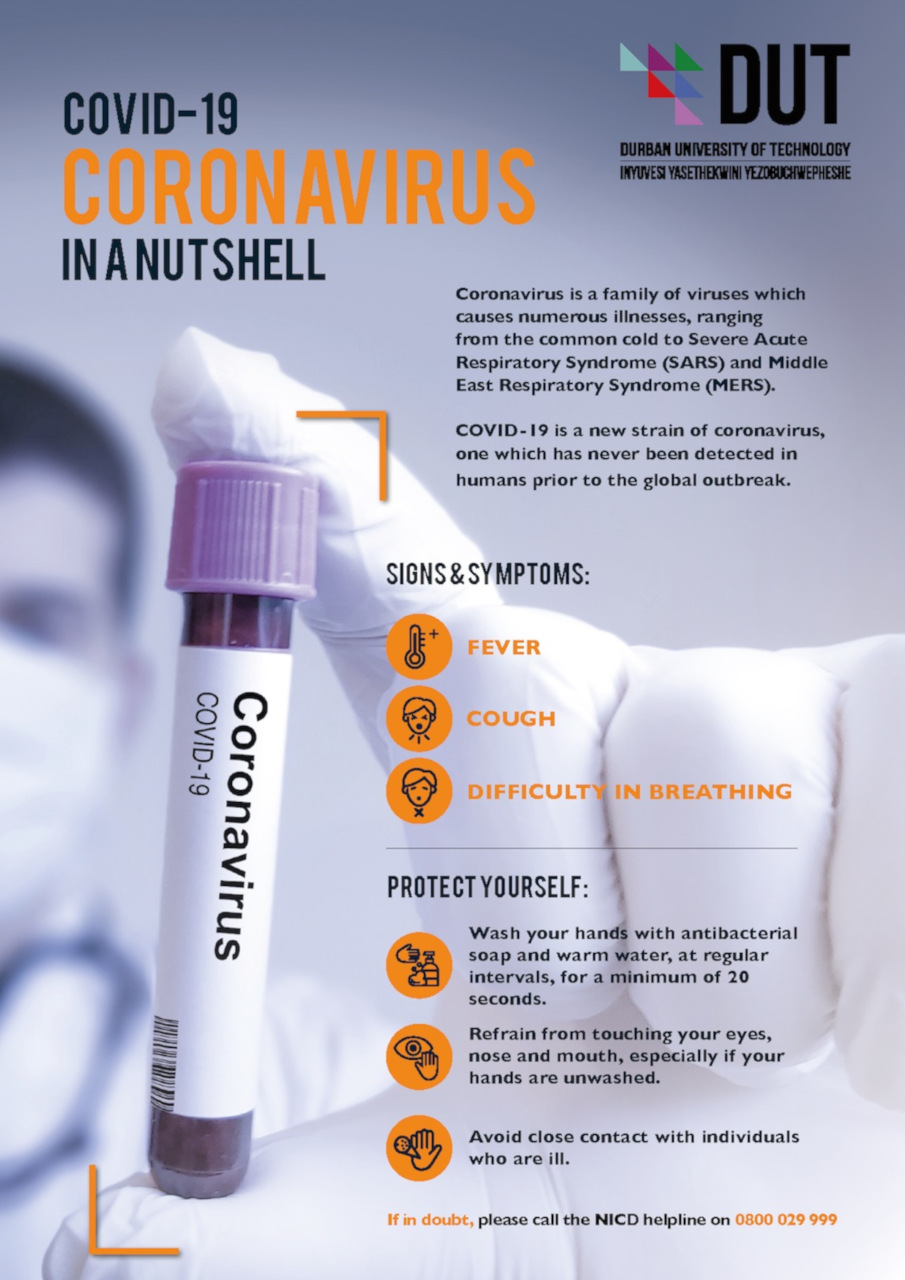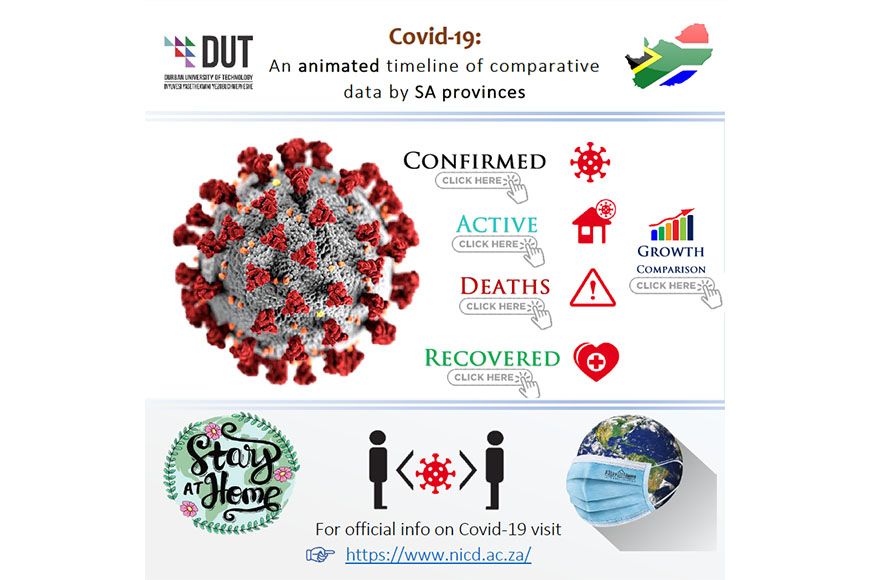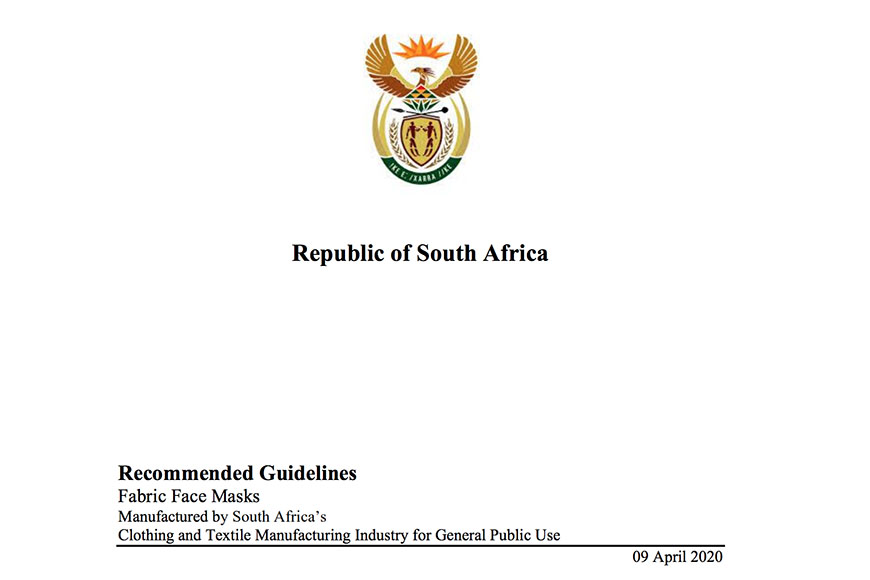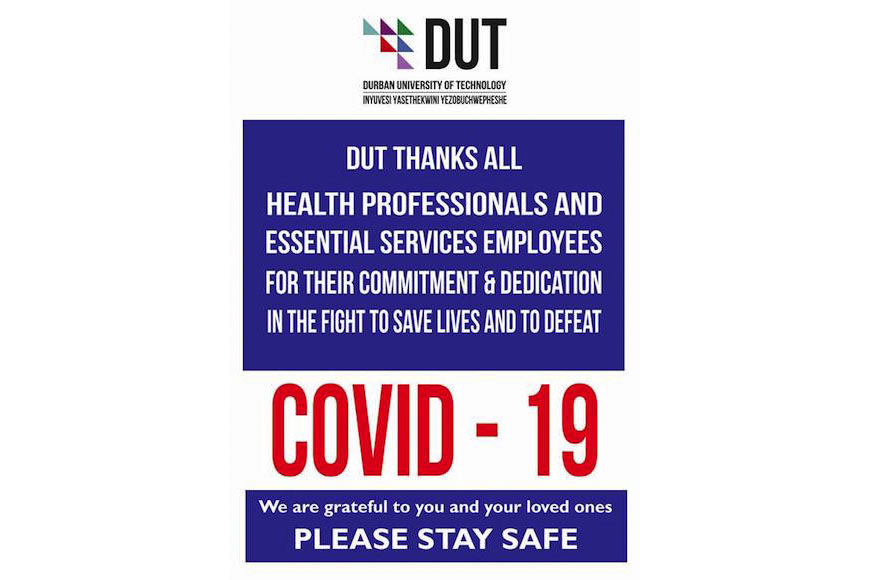Menu
- Fees Booklet
- Academic Calendar 2024
- Study Opportunities 2024
- House Committee Elections 2024
- Spring Graduation Ceremonies 2023
- SRC Online Elections 2023
- ENVISION2030 Institutional Awards
- Autumn Graduation Ceremonies 2023
- Court Order 29 Mar 2022
- Court Interdict application 28 Mar 2022
- Career Leaflets
- Handbooks
- Court Order – Forums Threat
- ENVISION2030
- Why Choose DUT
- “Missing Middle” application form
- NSFAS New Students
- NSFAS
- Honorary Doctorates
- DUTLink Newsletter
- Lecture Timetable
- Association of Commonwealth Universities
DUTLINK
Our Facebook Page
DUT COVID-19 related enquiries
Email: covid-enquiries@dut.ac.za Telephone: 031 373 3760
What is coronavirus and should I be concerned?
A coronavirus is a type of virus. As a group, coronaviruses are common across the world.
Generally, coronavirus can cause more severe symptoms in people with weakened immune systems [such as people taking cortisone, biologicals and chemotherapy] older people, and those with long-term conditions like diabetes, cancer and chronic lung disease.
What can I do to reduce my risk of catching coronavirus?
There are things you can do to help stop germs like coronavirus spreading:
- Wash your hands more often than usual, for 20 seconds each time with soap and water or use hand sanitiser, especially when you:
- Always carry tissues with you and use them to catch your cough or sneeze. Then bin the tissue, and wash your hands, or use a hand sanitiser;
- get home or get to work;
- blow your nose, sneeze or cough;
- eat or handle food;
- Avoid touching your eyes, nose and mouth with unwashed hands;
- Avoid close contact with people who are unwell.
What is the difference between self-isolation and self-quarantine
Self-quarantine
Self-quarantine is something you can do at home. It means avoiding contact with other people and social situations as much as possible. You do this to stop other people from getting coronavirus.
You need to self-quarantine if you do not have symptoms of the coronavirus but you are:
- a close contact of a confirmed case of coronavirus; or
- someone that is returning from international travel and/or the affected countries.
Self-isolation
Self-isolation means staying indoors and completely avoiding contact with other people. You need to do this if you have symptoms of the coronavirus. This is to stop other people from getting it.
You will need to self-isolate:
- if you have symptoms of the coronavirus;
- before you get tested for the coronavirus;
- while you wait for test results;
- if you have had a positive test result for coronavirus.
How to self-quarantine
- If you are well, but you have been in close contact with a case of coronavirus you will need to self-quarantine. You will also need to self-quarantine if you are returning from international travel. This is to stop other people from getting coronavirus.
- Self-quarantine means avoiding contact with other people as much as possible by staying at home or in your hotel.
- You can still go outside for walks, runs or cycles on your own. However, you should not spend time in close contact with other people.
- Other household members do not need to restrict their activities unless they are told to.
How to self-isolate
- If you develop symptoms, you will need to self-isolate and phone your GP. Do not go to a GP surgery, pharmacy or hospital. The GP will assess you over the phone. If they think you need to be tested for the coronavirus, they will arrange a test.
- You will need to self-isolate if you have coronavirus or have symptoms of coronavirus. This could be before you are tested for the coronavirus, while you wait for the test results or when a positive result is confirmed.
- Most people with coronavirus will only have mild symptoms and will get well within weeks. Even though the symptoms are mild, you can still spread the virus to others.
- If you have to self-isolate, stay indoors and avoid contact with other people.
- Only stop self-isolation when BOTH of these apply to you:
- You have had no fever for 5 days; AND
- It has been 14 days since you first developed symptoms.
How do I manage self-isolation?
If you develop symptoms of coronavirus, and need to self-isolate:
Do
- Stay at home, in a room with the window open;
- Keep away from others in your home as much as you can;
- Check your symptoms – call a doctor if they get worse;
- Phone your doctor if you need to – do not visit them;
- Cover your coughs and sneezes using a tissue – clean your hands properly afterwards;
- Wash your hands properly and often;
- Use your own towel – do not share a towel with others;
- Clean your room every day with a household cleaner or disinfectant;
- Stay in contact with your GP: if your symptoms develop or get worse, phone your GP.
Don’t
- Go to work, school, religious services or public areas;
- Share your things;
- Use public transport or taxis;
- Invite visitors to your home;
- Have contact with older people, anyone with long-term medical conditions and pregnant women;
- It is okay for friends, family or delivery drivers to drop off food or supplies. Make sure you’re not in the same room as them, when they do.
Make sure you’re not in the same room as them, when they do.
How do I self-isolate if I am living with others?
If you are required to self-isolate, but share your living spaces with others:
- Stay in a room with a window you can open.
- If you can, use a toilet and bathroom that no one else in the house uses.
- If you have to share a bathroom with others, use the bathroom last and then clean it thoroughly.
- Do not share any items you have used with other people. These include:
- dishes
- drinking glasses
- cups
- eating utensils
- towels
- bedding
How do I manage mealtimes?
- If possible, have someone leave your food on a tray at your bedroom door.
- When you have finished, leave everything on the tray at the door.
- This should be collected and put in a dishwasher and hands washed properly afterwards. If you do not have a dishwasher:
- Wash in hot soapy water, wearing rubber gloves
- Leave to air-dry
- Wash the rubber gloves while you are still wearing them
- Remove gloves and wash your hands
What do I do with my laundry?
- Put your laundry in a plastic bag. Have someone collect it from your bedroom door. If possible, they should wear rubber gloves.
- They should:
- wash the laundry at the highest temperature for the material, with a laundry detergent
- clean all surfaces and the area around the washing machine
- wash the rubber gloves while still wearing them
- wash their hands thoroughly with soap and water after removing the gloves
- If possible, tumble dry and iron using a hot setting or steam iron.
- Do not take laundry to a launderette.
How do I manage rubbish and waste?
- Put all the waste that you have used, including tissues and masks, in a plastic rubbish bag. Tie the bag when it is about three-quarters full. Place the plastic bag in a second bin bag and tie the bag.
- Treat all cleaning waste in the same way.
- Do not put the rubbish bags out for collection for 72 hours. After that, the bags can be put out for collection in regular domestic waste.
How do I keep well during self-isolation?
- Keep yourself mobile by getting up and moving around as much as possible. If you have, a garden or backyard go out and get some fresh air, but keep more than 1 meter away from other people.
- Self-isolation can be boring or frustrating. It may affect your mood and feelings. You may feel low, worried or have problems sleeping.
- You may find it helps to stay in touch with friends or relatives by phone or on social media.
How do I care for a child or someone else in self-isolation?
- You may be caring for a child, family member or someone who needs support while they are in self-isolation. If you are, follow the advice above.
- You should also:
- stay away from them as much as possible (at least 1m) and avoid touching them – use your phone to communicate
- wash your hands properly every time you have contact with the person
- if you have face masks, wear one and have it on when you have to be in the same room
- if you have to clean phlegm or spit from their face use a clean tissue, put it into a waste bag and wash your hands
- put them in a well-ventilated room alone
- limit their movement in the house
- get them to use a different toilet if possible
- limit the number of caregivers
- keep them away from older people, people with long-term conditions or pregnant women
- If possible, only one person should look after the person self-isolating. Ideally, this would be someone who is in good health.
What are the General Directions for containing the spread of Covid-19 within my community?
- Wash your hands often!!
- Wash your hands properly and often with soap and water or clean them with an alcohol-based sanitiser.
- Cover your mouth and nose with a tissue or your sleeve when you cough and sneeze.
- Put used tissues into a bin and wash your hands.
How to wash your hands properly
The purpose of hand-washing is to eliminate all traces of the virus on your hands, and a quick scrub and a rinse will not do this. Follow the 5-step process below for effective handwashing:
- Wet hands under running water;
- Apply enough soap to cover your wet hands;
- Scrub all surfaces of your hands – including the back of your hands, between your fingers and under your nails – for at least 20 seconds [sing ‘Happy Birthday’ to yourself twice!]
- Rinse thoroughly under running water; and
- Dry your hands with a clean cloth or a single-use paper towel
- Use a detergent or disinfectant to clean your home
- Many cleaning and disinfectant products sold in supermarkets can kill coronavirus on surfaces.
- Clean the surface as usual with a detergent, disinfectant or disinfectant wipe. This includes:
- counters
- table-tops
- doorknobs
- bathroom fixtures
- toilets and toilet handles
- phones
- keyboards
- tablets
- bedside tables
- If you have them, wear rubber gloves when cleaning surfaces, clothing or bedding. Wash the gloves while still wearing them, and then clean your hands after you take them off.
- Facemasks are for people who is infected!
- You may have to be in a room with someone who has coronavirus. If you do, and you have facemasks, the person with coronavirus should wear the mask.
- If you wear a mask, you should put it on and take it off in the room in which you are self-isolating.
- Wash your hands before you put it on.
- Put the mask in your coronavirus rubbish and wash your hands properly after you take it off.
Don’t
- Touch the front of the mask when taking it off.
- Use a mask when it is wet.
- Re-use a mask.
- How to seek medical attention
- To seek medical help from a doctor or hospital, call ahead of time to book an appointment.
- You will be asked to take precautions when you attend for treatment. Follow the instructions you are given.
- If you have a mask, wear it to protect others. Stay at least 1.5m away from other people. Cover your coughs or sneezes with your elbow.
- Tell the doctor about:
- your symptoms;
- any travel history; and
- any recent contact with someone who has COVID-19.
Getting tested
- Your doctor will tell you if you should be tested. They will arrange for the test.
- You will only be tested if your doctor decides you meet the criteria:
- You have returned from overseas in the past 14 days AND you develop respiratory illness with or without fever;
- You have been in close contact with a confirmed COVID-19 case in the past 14 days AND you develop respiratory illness with or without fever;
- You have severe community-acquired pneumonia and there is no clear cause;
- You are a healthcare worker who works directly with patients AND you have a respiratory illness and a fever.
- There is a global shortage of the test kits that pathologists use to diagnose COVID-19. This is why we are doing targeted testing instead of widespread testing.
After testing
- It may take a few days for the test results to come back.
- If you have serious symptoms you will be kept in hospital and isolated from other patients to prevent the virus spreading.
- If your doctor says you are well enough to go home while you wait for your test results, you should:
- self-quarantine at home and do not attend work or school;
- wash your hands often with soap and water;
- cough and sneeze into your elbow;
- avoid cooking for or caring for other members of your household;
- wear the mask your doctor gives you if you cannot avoid close contact with other people
5. For questions about testing or patient welfare, call the Coronavirus Health Information Line on 0800 029 999.
Sources: https://publichealthmatters.blog.gov.uk/2020/01/23/wuhan-novel-coronavirus-what-you-need-to-know/
https://www2.hse.ie/conditions/coronavirus/self-isolation-and-limited-social-interaction.html
Who to Contact?
The email address is:
For COVID-19 related questions and comments: covid-enquiries@dut.ac.za
The telephone Hotline:
Please call the DUT COVID-19 Hotline (office hours): 031 373 3760
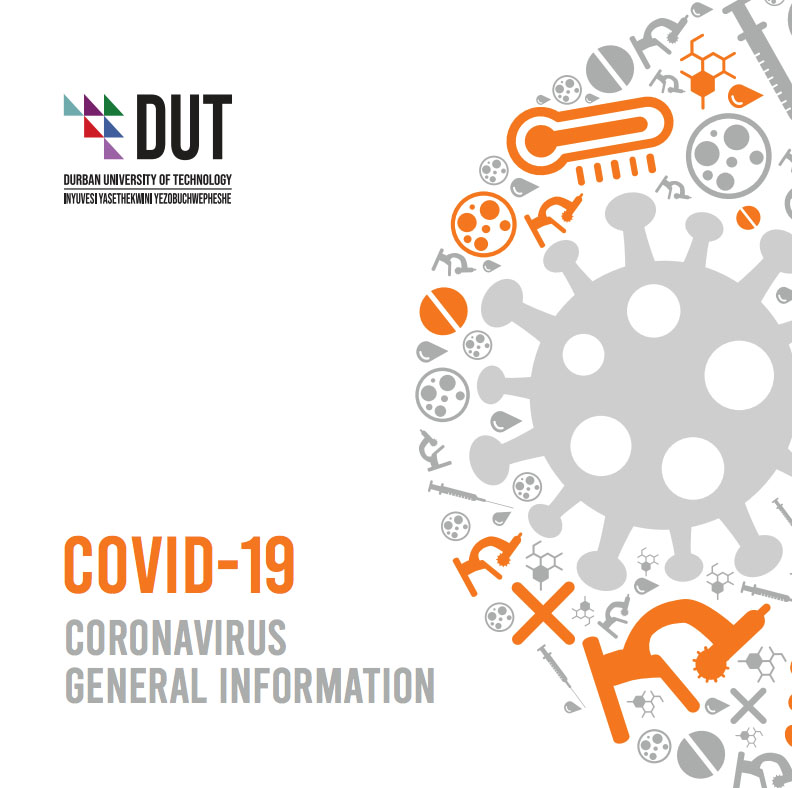
COVID-19 DUT General Information Guide |

Step-By-Step Guide to Control Covid-19 Infections. |

COVID-19-Home-Guide |
University Statements
Campaign Awareness
General




